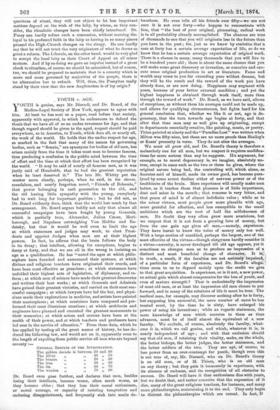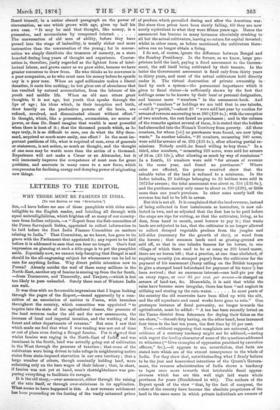YOUTH v. AGE.
YOUTH is genius, says Mr. Disraeli, and Dr. Beard, of the Medico-Legal Society of New York, appears to agree with him. At least he has sent us a paper, read before that society, apparently with approval, in which he endeavours to defend the thesis that we have all of us an undue reverence for Age, and that though regard should be given to the aged, respect should be paid everywhere, as in America, to Youth, which does all, or nearly all, the work of the world. He holds that the undue respect for age, so marked in the fact that many of the names for governing bodies, such as " Senate," are synonyms for bodies of old men, has arisen mainly from the time it takes most men to become famous, thus producing a confusion in the public mind between the time of effort and the time at which that effort has been recognised by the world. " It may be said of nearly all famous men, as it was justly said of Humboldt, that he had the greatest reputation when he least deserved it." The late Mr. Whitty put the matter more clearly, perhaps, when he said, in his clever, scandalous, and nearly forgotten novel, "Friends of Bohemia," that power belonging in each generation to the old, and the old having little sympathy with the young, everybody had to wait long for important position ; but he did not, as Dr. Beard evidently does, think that the world lost much by that arrangement. Dr. Beard argues boldly not only that almost all successful campaigns have been fought by young Generals, which is partially true, Alexander, Julius Cesar, Marl- borough, and Napoleon outweighing Von Moltke and Ra- detsky, but that it would be well even to limit the age at which statesmen and judges may work, to elect Presi- dents and appoint Judges when men are at their highest powers. In fact, he affirms that the brain follows the body in its decay ; that intellect, allowing for exceptions, begins to decay at forty, and that we are all in the wrong in insisting on age as a qualification. He has "noted the ages at which philo- sophers have founded and announced their systems, at which divines and religious teachers have originated their creeds, and have been most effective as preachers ; at which statesmen have unfolded their highest acts of legislation, of diplomacy, and re- form ; at which men of science have made their greatest discoveries and written their best works ; at which Generals and Admirals have gained their greatest victories, and carried on their most suc- cessful campaigns ; at which lawyers have led the bar, and physi- cians made their explorations in medicine, and artists have painted their masterpieces ; at which musicians have composed and per- formed their most illustrious creations ; at which architects and engineers have planned and executed the greatest monuments to their memories ; at which actors and orators have been at the zenith of their power, and at which teachers and professors have led eras in the service of education." From these data, which he has applied by testing all the great names of history, he has de- duced the following law, and would act on it, apparently even to the length of expelling from public service all men who are beyond seventy :—
GENERAL RESULTS OF THE INVESTIGATION.
The golden decade is between 30 and 40
The silver u PP 40 „ 50 The brazen PP IP 20 „ 30 The iron PI PI 50 „ GO The tin 21 71 GO „ 70 The wooden „ Pt 70 „ 80
Dr. Beard even goes further, and declares that men, besides losing their intellects, become worse, often much worse, as they become older ; that they lose their moral enthusiasm, or moral courage, or capacity of resisting temptation and
enduring disappointment, and frequently sink into .senile de-
bauchees. He even tells all his friends over fifty—we are not sure it is not over forty—who happen to remonstrate with him, that " the best of your original, pioneering, radical work is in all probability already accomplished. The chances are tens of thousands to one that you will originate less in the future than you have in the past ; for, just as we know by statistics that a man at forty has a certain average expectation of life, so do we know that he has a certain average expectation of original work. There is a chance in many, many thousands that you will live to be a hundred years old ; there is about the same chance that you will make some great discovery or invention, or conceive and exe- cute some original production in art or literature. Fame and wealth may come to you far exceeding your wildest dreams, but they will be the result and the reward of the work you have already done, or are now doing. Happiness may augment with years, because of your better external condition ; and yet the highest happiness is obtained through work itself, more than through the reward of work." Dr. Beard, as we have said, allows of exceptions, as without them his averages could not be made up, and allows for qualifying circumstances, but fights hard for his general conclusion that, whether we like it or not, age is de- generacy, that the turn towards age begins at forty, and that after that time men may as well give up originating, except in departments essentially creative, like painting, music, or poetry. Titian painted at ninety and the "Paradise Lost" was written when Milton was fifty-nine, but these are no more proofs than Shelley's or Keats' precocity in verse. They do not alter the averages.
We must all grow old, and Dr. Beard's theory is therefore a melancholy one for all men, but we suspect it requires modifica- tions far more serious than any he suggests. His argument, for example, as to moral degeneracy is, we imagine, absolutely un- true, except in cases such as the two or three he gives, where the original nature being bad, the controlling will, which alone, as Socrates said of himself, made its owner good, has become para- lysed by some secret decline either of nervous power or of the healthiness of the brain. Mere experience will usually make men better, as it teaches them that pleasure is of little importance, dust and ashes in the mouth ; that remorse is very bitter, and that peace of mind is of almost indefinite value ; while as to the minor virtues, most people grow more placable with age, more grateful for affection, and less susceptible to the small ambitions which are the root of half the selfishnesses of men. No doubt they very often grow more avaricious, but we suspect that it is not from a growing love of money, bat from the one gain age gives all men,—namely, experience. They have learnt to know the value of money only too well. With a large section of mankind, perhaps the largest, one of the most effective of the virtues—though clergymen hardly consider it a virtue—serenity, is never developed till old age appears, yet it sometimes so changes men as to produce an impression of a distinct and most beneficial change of character. It is, in truth, a result, if the faculties are not seriously impaired; of a particular form of experience, and Dr. Beard's allega- tions seem to us to depend mainly upon the credit we give to that great acquisition. Is experience, or is it not, a new power, an actual gain which almost compensates for the loss of youth, and even of mature strength ? That is undoubtedly the impression of most old men, or at least the impression old men choose to put forward, and in many of the relations of life it must be true. The medical man, for example, may discover nothing after he is forty, but supposing him successful, the mere number of cases he has treated must, by the time he is sixty, have enlarged his power of using his inventions ; while as regards statesmen, the mere knowledge of men which accretes to them as time advances, must be of itself almost the equivalent of a new faculty. We exclude, of course, absolutely the faculty, what- ever it is, which we call genius, and which, whatever it is, is nearly independent of age ; and with that exclusion should say that old men, if retaining their vitality, make, on the whole, the better bishops, the better judges, the better statesmen, and the better soldiers of the two. They are apt, of course, to lose power from an over-contempt for youth, though even this is not true of, say, Mr. Disraeli, who on Dr. Beard's theory is an old man, or of M. Thiers, who is an old man on any theory ; but they gain it immensely in experience, with its absence of rashness, and its recognition of all obstacles to success. Dr. Beard will have it that enthusiasm dies with years, but we doubt that, and rather conceive that the expression of it dies, many of the great religious teachers, for instance, and many more philanthropists, maintaining it to the end. They only begin to distrust the philanthropies which are unreal. In fact, D
Beard himself, in a rather absurd paragraph on the power of conversation, as one which grows with age, gives up half his own case. " It may be said that thought, like money, is a possession, and accumulates by compound interest The conversation of old men of ability, before they have passed into the stage of imbecility, is usually richer and more instructive than the conversation of the young ; for in conver- sation we simply distribute the treasures of memory, as a store hoarded daring long years of thought and experience. Conver- sation is, therefore, justly regarded as the lightest form of intel- lectual labour, and grows easier as we grow older, because we have greater resources to draw from. He who thinks as he converses is a poor companion, as he who must earn his money before be spends any is a poor man. When an aged millionaire makes a liberal donation, it costs him nothing; he but gives out of abundance that has resulted by natural accumulation, from the labours of his youth and middle life. When an old man utters great thoughts, it is not age, but youth that speaks through the lips of age ; his ideas which, in their inception and birth, drew heavily on the productive powers of the brain, are refined, revolved, and disseminated almost without effort." Is thought, which, like a possession, accumulates, no source of power, or does Dr. Beard imagine that wealth is most powerful when there is least of it ; that the thousand pounds which, as ho says truly, it is so difficult to save, can do what the fifty thou- sand, acquired so much more easily, can effect ? In the most im- portant positions of life, what is required of men, even of generals or statesmen, is not action, so much as thought, and the thought of one man may be worth more than the action of a thousand. Experience will not make a Cresar or an Alexander, but it will immensely improve the competence of most men for great positions, and amounts in many cases to a new force, which compensates for declining energy and decaying power of originating new things.







































 Previous page
Previous page